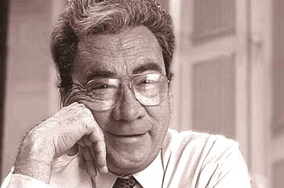William G. McGowan fought a lot of good fights in his life. The first was out of the rail yards of Wilkes-Barre, Pennsylvania, to Harvard, where he arrived to start business school with only one year's tuition in hand. (He bet that he'd win a scholarship for his second year; he was right.)

The next was against the world's largest business empire, AT&T, which held a monopoly on the nation's local and long distance phone service — right down to our telephones. Mr. McGowan's antitrust lawsuit against AT&T inspired the federal action that eventually broke up its market dominance. Meanwhile, Mr. McGowan's company, MCI, launched a competing service.
Mr. McGowan's next fight was with heart failure. A 1986 heart attack damaged his heart so badly that only a heart transplant could save his life: Mr. McGowan received a new heart at UPMC the next year.
While convalescing, Mr. McGowan engaged his restless, entrepreneurial mind with all he could learn about medical research. Ever the visionary, Mr. McGowan believed that artificial organs could alleviate the shortage of donor organs and perhaps provide permanent alternatives to transplantation. In 1990, William and Sue Gin McGowan donated $1 million to fund a like-minded center. The McGowan Center for Artificial Organ Development was established in 1992, shortly after Mr. McGowan's death.
As science has evolved, so has Mr. McGowan's namesake institute. The twin revolutions in genetic and tissue engineering began to shape the idea that, ultimately, regrowing the patient's own tissues to replace those lost to disease is an achievable — and preferable — goal. When the mission of the McGowan Center expanded to include "biohybrid" organs (those that combine artificial and natural components), tissue engineering, and cellular therapies, it was renamed the McGowan Institute for Regenerative Medicine. The Institute is the single base of operations for leading scientists and clinicians at UPMC and the University of Pittsburgh working to develop new regenerative therapies.

















